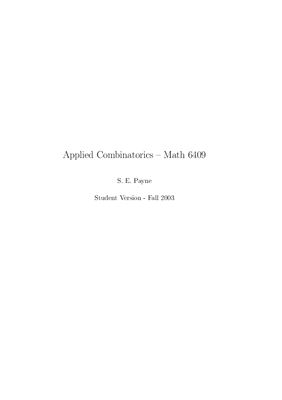University of Colorado, 2003, -216 pp.
The course at CU-Denver for which these notes were assembled, Math 6409 (Applied Combinatorics), deals more or less entirely with enumerative combinatorics. Other courses deal with combinatorial structures such as Latin squares, designs of many types, finite geometries, etc. This course is a one semester course, but as it has been taught different ways in different semesters, the notes have grown to contain more than we are now able to cover in one semester. On the other hand, these notes contain considerably less material than the standard textbooks listed below. It is always difficult to decide what to leave out, and the choices clearly are a reflection of the likes and dislikes of the author. We have tried to include some truly traditional material and some truly nontrivial material, albeit with a treatment that makes it accessible to the student.
1 Basic Counting Techniques
2 Systems of Representatives and Matroids
3 Polya Theory
4 Formal Power Series as Generating Functions
5 M?bius Inversion on Posets
The course at CU-Denver for which these notes were assembled, Math 6409 (Applied Combinatorics), deals more or less entirely with enumerative combinatorics. Other courses deal with combinatorial structures such as Latin squares, designs of many types, finite geometries, etc. This course is a one semester course, but as it has been taught different ways in different semesters, the notes have grown to contain more than we are now able to cover in one semester. On the other hand, these notes contain considerably less material than the standard textbooks listed below. It is always difficult to decide what to leave out, and the choices clearly are a reflection of the likes and dislikes of the author. We have tried to include some truly traditional material and some truly nontrivial material, albeit with a treatment that makes it accessible to the student.
1 Basic Counting Techniques
2 Systems of Representatives and Matroids
3 Polya Theory
4 Formal Power Series as Generating Functions
5 M?bius Inversion on Posets

